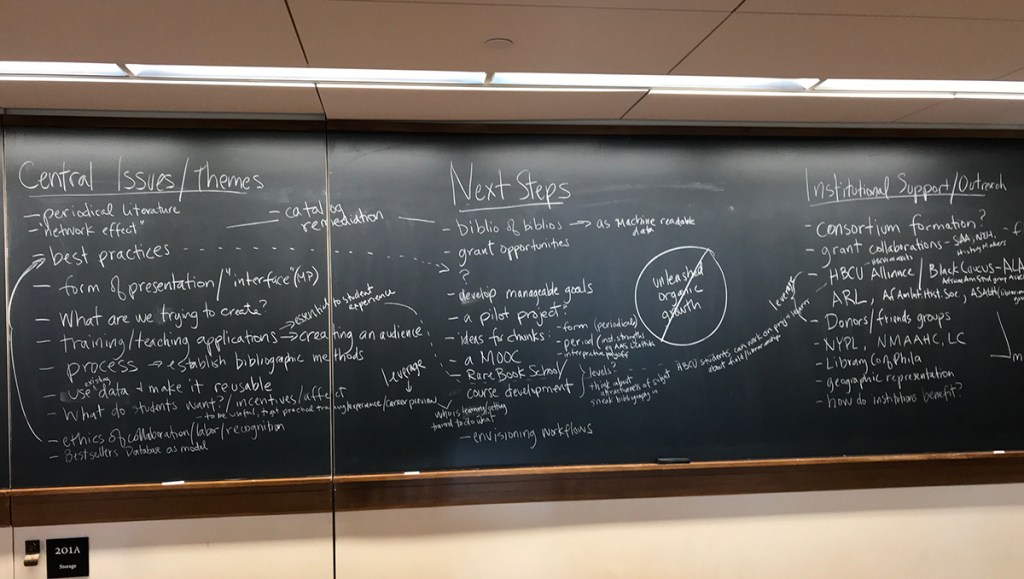
Building Black Bibliography
The Black Bibliography Project (BBP) is a collaborative endeavor. Faculty, library professionals, and graduate students from Yale and Rutgers University comprise its core, but the BBP has also recruited scholars, curators, cataloguers and digital humanities specialists from across the country to grapple with the conceptual challenges we face in our effort to revive the practice of descriptive bibliography for African American literary studies and to bring these disciplines into dialogue with one another.
Over the course of our two-year history, the BBP has convened several “think tanks” and workshops with these colleagues, where we have developed our digital approach to bibliographic data and have devised pedagogy in book history explicitly designed for African American literary studies.
For brief summaries of the planning summits and workshops we’ve organized, click on the links, below.
- March 2017: The Tech Meet-Up
- October 2017: Establishing a National Network
- May 2018: Devising a Prototype
- November 2018: Designing Data Categories
- January 2019: Descriptive Bibliography and the BBP Data Model
March 2017: The Tech Summit
In March 2017, we met at Rutgers University in New Brunswick NJ to discuss the technical challenges that creating a Black Bibliography database might entail. Who would be the ideal users of this information? What existing technologies might be able to capture bibliographic data and reach our ideal users? How comprehensive could such a database be?
October 2017: Establishing a National Network
In October 2017 we assembled a group of librarians, curators, and archivists from the nation’s leading repositories of African American print culture to discuss the “state of the art” of Black bibliography, exploring how the practice has been used to manage and facilitate access to Black print material historically and in the present day. This meeting concluded with a productive brainstorming session at which participants discussed the possibility of a national consortium linking librarians and scholars interested in African American book history, and the collaborative production of a list of reference sources and finding aids—a bibliography of bibliographies.
May 2018: Devising a Prototype
The BBP sponsored a day-long intensive seminar in bibliographic description led by Michael Winship (University of Texas) at Yale’s Beinecke Library. A group of faculty and graduate students discussed key elements of bibliographic description so as to devise descriptive categories that the Beinecke Library’s metadata team could use to structure our first data model prototype.
November 2018: Designing Data Categories
A small group of scholars and metadata librarians met to refine categories of bibliographic description to be used on a “test corpus,” and to identify problem areas for the data model.
January 2019: Descriptive Bibliography and the BBP Data Model
The BBP sponsored a week-long intensive seminar in bibliographic description led Michael Winship (University of Texas) at Yale’s Beinecke Library. Using a test corpus of select print materials ranging from the 18th to 20th centuries, the group of faculty and graduate students learned principles of bibliographic description as we worked through landmarks in the history of black print, from Phillis Wheatley to ntozake shange. We also spent time testing the first data model developed by the Beinecke Library’s metadata librarians and cataloguers, in consultation with the BBP’s co-directors and scholar-consultants.
The BBP’s Philosophy of Consortium Building
Since Black print culture materials are housed in a variety of institutions and repositories, we are committed to building partnerships that foster access, equity, and capacity-building for each member and institution involved. This means that we aim for an organizational structure that is inclusive and public facing. We are also committed to recognizing that “resources” and “capital” exist and can be leveraged in varied forms: financial, intellectual, cultural, social, political. This means we are flexible in our definitions of “resource exchange” among consortium members. Finally, we are committed to bridging the disciplines and professions of literary criticism and library science. This means we actively engage scholars, librarians, curators, and cataloguers in critical dialogue and collaborative work with one another.